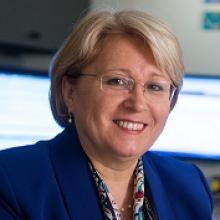HyFlex Instructional Design: The Future of Education in the Post Pandemic Era
Concurrent Session 3 & 4 (combined)
Brief Abstract
This workshop will introduce participants to an emerging concept of HyFlex course design principles illustrating the differences between online, blended, hybrid, and flipped learning in the context of the core elements of each modality. Through group discussion, participants will critically examine the feasibility of HyFlex learning in the post-pandemic era.
Presenters

Extended Abstract
With the COVID-19 pandemic, the entire education system and all educational activities have had to go virtual in a matter of days, with little to no time for teaching faculty and learners how to prepare themselves for this quick transition. Educators at all levels have struggled to deliver their courses with the drastic changes and further changes seem to continue until the new norms have been shaped for the future of education. Now many of those educators have little or no experience with the several types of technology-enhanced teaching modalities. Furthermore, they may not be able to accurately describe fundamental differences between online, blended, flipped models, or blended, and hybrid approaches. While these modalities build upon a solid foundation of similar instructional design principles, each model has its unique structure. In addition to these approaches, another format has been added to the technology-enhanced teaching model spectrum, which is called Hybrid-Flexible (HyFlex). This model presents the components of hybrid learning in a flexible course structure that gives learners the option of attending sessions in the classroom, participating online, or doing both. This workshop will introduce participants to an emerging concept of HyFlex course design principles illustrating the differences between online, blended, hybrid, and flipped learning in the context of the core elements of each modality. Through a participative, interactive discussion forum, participants will critically examine the feasibility of HyFlex learning in the post-pandemic era in the context of faculty and learners’ responsibilities and effective assessment approaches, including effective engagement strategies in multi-modal delivery solutions.
The following questions will guide the discussion forum:
- What is unique about the HyFlex course design compared to other modalities (online, blended, hybrid, and flipped learning)? Is the HyFlex course design appropriate at all levels of education or courses?
- What responsibilities should faculty and learners carry out to attain the goals and objectives of courses?
- How should we define program learning outcomes in a HyFlex course and what assessment approaches can be suitable and produce effective results?
- What can be potential challenges and solutions when students are given the freedom and ability to choose which mode to participate in a session?
- Do educators/teaching faculty need additional expertise and resources in the HyFlex course delivery?
- What is your vision about the changes in overall education in this post-pandemic era?
Level of Participation:
This workshop is structured to create a mutual learning experience using mini-interactive lectures and a participative, interactive discussion method to come up with a thought-provoking consensus on HyFlex courses. Participants will be divided into four groups. Each group will be assigned two questions to represent specific points of their view. In each group, the group members will identify individuals for the following roles:
- A recorder who will write down the most important points from the group's discussion.
- A provocateur who keeps the discussion going and stays challenging.
- A reporter who reviews the most important notes written down and moves back to the center of the room to share the team's thoughts with the whole group.
After the reporters report back, a whole group discussion will follow to come up with a consensus on important discussion points for each question.
Session Goal:
This workshop aims to increase awareness of various technology-enhanced teaching modalities with the emerging concept of the HyFlex course design principles through the participative discussion method.
Learning Objectives:
At the end of this session, participants will be able to:
- Accurately describe the differences between online, blended, hybrid, and flipped learning, including the genesis of the HyFlex course model
- Examine the core elements of HyFlex design principles that enable flexible learner participation in multiple delivery modalities
- Discuss the feasibility of HyFlex learning in the post-pandemic era in the context of faculty and learners’ responsibilities and effective assessment approaches
Workshop Agenda, Topics/Activities (90 Minutes)
Step 1 (5 minutes): Opening
Introduction (agenda review)
Step 2 (10 minutes): Warm Up - Quick knowledge check!
A short quiz on the technology-enhanced teaching modalities (Online, Blended, Flipped, Hybrid, and HyFlex)
Step 3 (20 minutes): Introduction to HyFlex instruction (Interactive mini-lecture)
·What is HyFlex instruction?
- Universal Principles for HyFlex Course Design: Four Pillars (Learner Choice, Equivalency, Reusability, Accessibility)
- How to teach with the same materials in all modes
- Faculty and learners’ responsibilities
- Effective assessment approaches
Step 4 (25 minutes): Participative, Interactive Discussion Forums (Four Groups)
- What is unique about the HyFlex course design compared to other modalities (online, blended, hybrid, and flipped learning)? Is the HyFlex course design appropriate at all levels of education or courses?
- What responsibilities should faculty and learners carry out to attain the goals and objectives of courses?
- How should we define program learning outcomes in a HyFlex course and what assessment approaches can be suitable and produce effective results?
- What can be potential challenges and solutions when students are given the freedom and ability to choose which mode to participate in a session?
- Do educators/teaching faculty need additional expertise and resources in the HyFlex course delivery?
- What is your vision about the changes in overall education in this post-pandemic era?
Step 5 (15 minutes): A Whole Group Discussion
Step 6 (15 minutes): Summary & Key Takeaways
- Take home messages and “next steps” to move forward
- Questions & Answers

